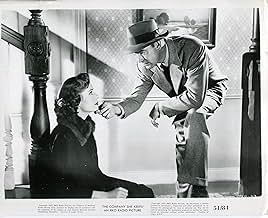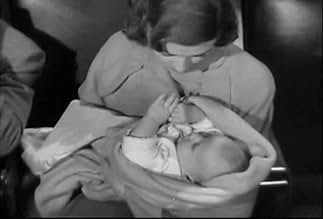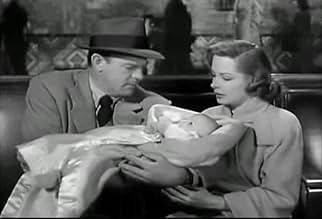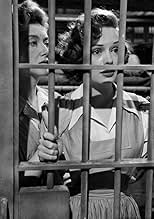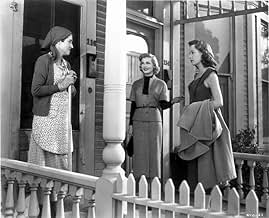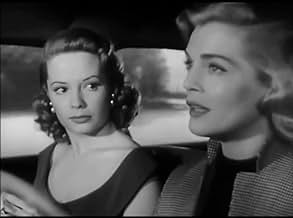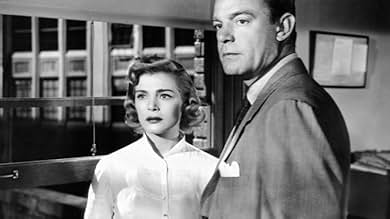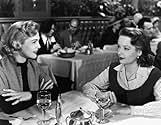VALUTAZIONE IMDb
6,3/10
672
LA TUA VALUTAZIONE
Aggiungi una trama nella tua linguaA female ex-convict meets a handsome man and they start dating, but she jeopardizes their relationship by not telling him that she was in prison--and he doesn't reveal his involvement with h... Leggi tuttoA female ex-convict meets a handsome man and they start dating, but she jeopardizes their relationship by not telling him that she was in prison--and he doesn't reveal his involvement with her parole officer.A female ex-convict meets a handsome man and they start dating, but she jeopardizes their relationship by not telling him that she was in prison--and he doesn't reveal his involvement with her parole officer.
- Regia
- Sceneggiatura
- Star
Eric Alden
- Sergeant of Detectives
- (non citato nei titoli originali)
Parley Baer
- Steve
- (non citato nei titoli originali)
Larry Barton
- Store Detective
- (non citato nei titoli originali)
June Benbow
- Myrtle
- (non citato nei titoli originali)
Lela Bliss
- Window Shopper
- (non citato nei titoli originali)
Gail Bonney
- Nurse
- (non citato nei titoli originali)
Recensioni in evidenza
I fell for Lizabeth Scott in Too Late for Tears, and she's delicious here as a tortured altruist. But it's Jane Greer as the broken dove who has a the limelight for the first two acts. The shades of gray--and green--make this a juicy little melodrama for both characters. Indeed, the lesbian tension is palpable in the beginning (and I didn't know about Scott's reputation), suggesting much more than the film makers may have intended (but, oh, what a movie this COULD have been...). Dennis O'Keefe is the weak link, looking older than his 43 years and strolling thru scenes without adding much flavor. Fay Baker is a nice addition as the tough girl that Greer might have been without the help she gets.
Jane Greer and Lizabeth Scott star in 1951's "The Company She Keeps," directed by John Cromwell and also starring Dennis O'Keefe. O'Keefe is columnist Larry Collins involved with parole officer Joan Wilburn (Scott), who has Diane Stuart (Greer) as a client. Stuart makes a play for Collins and gets him. The two fall in love, and Joan finds out about it, making her position rather difficult.
This isn't a big movie and provides a different sort of role for Scott. Here she's a good girl with shorter hair, and she almost reminds one of June Allyson. She's quite beautiful and does a good job, though I prefer her as a '40s bad girl. O'Keefe is a serviceable leading man.
The film belongs to the fabulous Greer. In the beginning, at her parole hearing, she's shy, soft and sweet. Once she's out - whoa! The angry, bitter tough gal comes through, only showing her vulnerable side once she falls for Larry.
Worth seeing for Greer.
This isn't a big movie and provides a different sort of role for Scott. Here she's a good girl with shorter hair, and she almost reminds one of June Allyson. She's quite beautiful and does a good job, though I prefer her as a '40s bad girl. O'Keefe is a serviceable leading man.
The film belongs to the fabulous Greer. In the beginning, at her parole hearing, she's shy, soft and sweet. Once she's out - whoa! The angry, bitter tough gal comes through, only showing her vulnerable side once she falls for Larry.
Worth seeing for Greer.
This film does not fall short by any means. The Company She Keeps is a story of a young woman's plight named Diane Stuart (played by Jane Greer) that lands her behind bars on more than one occasion and when the opportunity for parole arises she has developed such a defeatist attitude that she feels she is fighting everyone in the (in)justice system. If Diane did not have bad luck she would have no luck at all. Once out of prison she visits with her parole officer Joan Willburn (played by Lizabeth Scott) and by accident or intention Diane finds the man of her dreams a newspaper columnist named Larry Collins (played by Dennis O'Keefe).
The three main characters in this film, Diane Stuart (ex-con), Joan Wilburn (parole officer), and Larry Collins (newspaper columnist) form the love triangle that has deception written all over this screen play. Lies, lies, lies, or is it just that each person is reluctant to hurt the others feelings?
As the film progresses we the audience realize that even female paroled prisoners are still considered ex-cons and their life is subjected to hell, especially in the year 1951 which is when this film was released. Truth be told, the rights and freedoms of ex- cons has not progressed much over the past 70 odd years.
Inevitably Diane finds herself in a police line-up once again for nothing at all and she realizes her life is crap and any chance of true love, life and freedom was nothing more than a pipe dream.
I won't spoil the film for anyone, but I will say that the director John Cromwell provided the audience with a surprise ending that should make most of his audience leaving the movie theater with a lot to talk about. The performances of Lizabeth Scott, Jane Greer, and Dennis O'Keefe were top notch. After close to 70 years since the films release I felt the film still contains a lot of human interest as it relates to crime and punishment.
I give the film 4**** of 5*****.
The three main characters in this film, Diane Stuart (ex-con), Joan Wilburn (parole officer), and Larry Collins (newspaper columnist) form the love triangle that has deception written all over this screen play. Lies, lies, lies, or is it just that each person is reluctant to hurt the others feelings?
As the film progresses we the audience realize that even female paroled prisoners are still considered ex-cons and their life is subjected to hell, especially in the year 1951 which is when this film was released. Truth be told, the rights and freedoms of ex- cons has not progressed much over the past 70 odd years.
Inevitably Diane finds herself in a police line-up once again for nothing at all and she realizes her life is crap and any chance of true love, life and freedom was nothing more than a pipe dream.
I won't spoil the film for anyone, but I will say that the director John Cromwell provided the audience with a surprise ending that should make most of his audience leaving the movie theater with a lot to talk about. The performances of Lizabeth Scott, Jane Greer, and Dennis O'Keefe were top notch. After close to 70 years since the films release I felt the film still contains a lot of human interest as it relates to crime and punishment.
I give the film 4**** of 5*****.
When diane (jane freer) is released from prison, she has a hard time adjusting; her parole officer joan (lizabeth scott) does her best to help diane ease back into society, and a new job. And somehow goes on a date with her parole officer's boyfriend. But that huge chip on her shoulder keeps giving her away. She snaps at everyone, and blames others for her own insecurity. She's so determined to hide her parolee status that it ends up working against her. When joan's boyfriend falls for diane, it all hits the fan. How will diane, joan and larry deal with all this? Complicated. It all kind of plods along. It's all pretty unlikely, as these things go. Directed by john cromwell, who was caught up in the HUAC shenanigans in the 1940s, 1950s, rightly or wrongly. He made this film and "the racket" before he was suspended. He also specialized in fun adventures in exotic, far-away lands, which were usually the back lot. Story by ketti frings. Watchable, but not very exciting.
In 1950 director John Cromwell made two films about women in varying degrees of incarceration, first "Caged", and then this one. "Caged", dealing with women in prison, is gritty and realistic. "Company She Keeps," about the travails of a parolee, is neither.
As a previous IMDB reviewer stated, it starts off well, with a good scene of the prisoner in front of the parole board. Jane Greer invests her inmate with an interesting combination of hardness and vulnerability and the members of the parole board react to her with, mostly, sympathy mixed in with skepticism from the lone male board member. Then there are some hard hitting scenes with Greer and her sensitive parole officer who is well played by Liz Scott. Nice to see this veteran interpreter of hardened femme fatales in a good gal role for a change and because Scott is a fine, under rated actor she plays it without undue cloyingness.
Then Dennis O'Keefe, playing Scott's newspaper columnist boyfriend, enters the picture and all believability, intensity and interest vanish as we enter the trite realm of the Hollywood Love Triangle. Ketti Frings' dialogue switches from hard edged to purple and John Cromwell's direction goes heavy on the mush and light on the harrowing, with two glorious exceptions, the shoplifting temptation sequence and the great scene in the ladies holding cell which feels like Cromwell was just aching to return to "Caged". Which begs the question, Why didn't he? (Answer below)
Bottom line: You'd think after "Caged", which did well at the box office, that Cromwell could have done a straight on story about the difficulties of parole without mucking it up with this spurious nonsense. Wonder why he did it? Maybe the guy was more commercial than artistic. Give it a C plus.
As a previous IMDB reviewer stated, it starts off well, with a good scene of the prisoner in front of the parole board. Jane Greer invests her inmate with an interesting combination of hardness and vulnerability and the members of the parole board react to her with, mostly, sympathy mixed in with skepticism from the lone male board member. Then there are some hard hitting scenes with Greer and her sensitive parole officer who is well played by Liz Scott. Nice to see this veteran interpreter of hardened femme fatales in a good gal role for a change and because Scott is a fine, under rated actor she plays it without undue cloyingness.
Then Dennis O'Keefe, playing Scott's newspaper columnist boyfriend, enters the picture and all believability, intensity and interest vanish as we enter the trite realm of the Hollywood Love Triangle. Ketti Frings' dialogue switches from hard edged to purple and John Cromwell's direction goes heavy on the mush and light on the harrowing, with two glorious exceptions, the shoplifting temptation sequence and the great scene in the ladies holding cell which feels like Cromwell was just aching to return to "Caged". Which begs the question, Why didn't he? (Answer below)
Bottom line: You'd think after "Caged", which did well at the box office, that Cromwell could have done a straight on story about the difficulties of parole without mucking it up with this spurious nonsense. Wonder why he did it? Maybe the guy was more commercial than artistic. Give it a C plus.
Lo sapevi?
- QuizAt one point, four month-old Jeff Bridges, playing the baby Jane Greer is holding in the train station, was supposed to cry. To get him to cry, Jeff's mother, Dorothy Dean Bridges, suggested they pinch him.
- ConnessioniFeatured in 2019 Golden Globe Awards (2019)
I più visti
Accedi per valutare e creare un elenco di titoli salvati per ottenere consigli personalizzati
- How long is The Company She Keeps?Powered by Alexa
Dettagli
- Data di uscita
- Paese di origine
- Lingua
- Celebre anche come
- The Company She Keeps
- Luoghi delle riprese
- 114-116 North Hope Street, Los Angeles, California, Stati Uniti(Diane Stuart's apartment building)
- Azienda produttrice
- Vedi altri crediti dell’azienda su IMDbPro
- Tempo di esecuzione1 ora 22 minuti
- Colore
- Proporzioni
- 1.37 : 1
Contribuisci a questa pagina
Suggerisci una modifica o aggiungi i contenuti mancanti

Divario superiore
By what name was N.N. vigilata speciale (1951) officially released in Canada in English?
Rispondi
